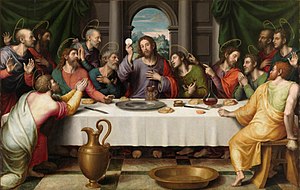What does it mean to us to share in the Eucharist?
At
his last meal with his disciples on the night he was betrayed, Jesus made use of the bread and wine to symbolize the
significance of his death. The breaking of the bread represented his body
broken for us (Luke 22:19). The whipping, the crown of thorns, the nails
pierced through his hands and feet and the agony on the cross were all for our
benefit as Isaiah 53:5 reminds us. The wine pointed to his blood shed for the
forgiveness of sin (Matthew 26:27-28). Hebrews 9:22 reminds us, “...without the shedding of blood, there is
no forgiveness” (Hebrews 9:22).
As
we partake of the Eucharist, we remember his death as he commanded us to, “do this in remembrance of me” (Luke
22:19). We remember that he died for our sins and in doing so, we participate
in a spiritual reality – Christ is with us in fellowship and communion.
We
also proclaim his death to the world, "For
as often we you eat of this bread and drink the cup, you proclaim the Lord's
death until He comes" (1 Cor. 11:26). We proclaim the fact and
significance to a world that does not know him and in so doing, we extend an
invitation to come and receive Jesus as Saviour and Lord.
We
also remember the eternal hope we have in Christ. Jesus will sup with us in
eternity, “I will not drink of this fruit
of the vine from now on until that day
when I drink it anew with you in my Father’s kingdom” (Matthew 26:29).
The Eucharist looks not only back to the death of Christ in the past but also
forward to the glory of Christ in his kingdom after he returns in power.
Jesus
initiates the Eucharist meal as the host and so he welcomes all who accept the
invitation to the Table. We need not be worried about whether our appearance,
ability or aptitude makes us a fitting guest. What matters is the love, grace
and hospitality of our host, Jesus, who invited us. It is provided, not because
we have earned the right to eat and drink with Jesus, but simply as an act of
divine love. Therefore, we must not think that if we are not right with God, we
should not partake of the meal. That is self-righteousness at work. The
invitation of Jesus means we are to make right our relationship with him
through confession and rest only on his unconditional love and promises to us.
It does not give us the right to stay wrong in the relationship and refrain. In
the Eucharist, there is no provision for non-repentance and abstinence.
So let us come whenever we are invited to the
Table and as we partake of the Eucharist, commit to living for Him who died for
us so that we may serve God and one another.


Comments
Post a Comment